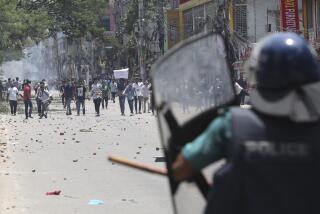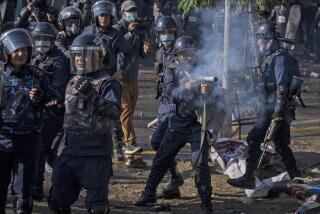Troop Presence, Warnings Bring Forced Calm to Tibetan Capital
- Share via
BEIJING — A massive military and police presence, together with clear warnings that demonstrations would be crushed, brought an enforced calm to the Tibetan capital of Lhasa on Friday.
A string of 72 vehicles carrying more than 1,200 troops drove through the streets of Lhasa in the morning in a show of force, according to the official China News Service. The report said the convoy included 42 military trucks, 10 vehicles with “automatic rocket guns” and 20 command cars.
Arrests continued of Tibetans suspected of participating in three days of pro-independence demonstrations and riots early this week, according to Lhasa residents who spoke by telephone with reporters in Beijing.
With martial law in effect, most Tibetans too frightened to talk and nearly all foreigners expelled from the city, no estimates were available on the scale of Friday’s arrests. Tibetans who spoke with foreigners in Lhasa on Thursday said they believed that up to 1,000 people had been arrested by that time.
At least 16 people were killed in this week’s clashes, according to official count, while foreign tourists have said it appears more likely that 20 to 50 died. Most casualties, according to foreign witnesses and official Chinese reports, came when police fired into rioting crowds.
30th Anniversary of Uprising
There had been widespread expectations both among Tibetan pro-independence activists and Lhasa authorities that there might be major protests Friday to mark the 30th anniversary of the beginning of an abortive uprising in which Tibetans sought to throw off Chinese rule.
Foreign tourists who flew Friday from Lhasa to Chengdu, in neighboring Sichuan province, told a reporter for United Press International that authorities had put up posters Thursday night warning that the army would use force if there were further demonstrations.
The exiled Dalai Lama, traditionally the temporal and spiritual leader of Tibet, issued a statement Friday from his headquarters at Dharmsala, India, calling on Chinese leader Deng Xiaoping to personally intervene to ease the crisis in Lhasa.
“I urge your personal intervention for bringing an immediate end to the repressive measures against innocent Tibetans and lifting of martial law in Lhasa,” the Buddhist leader said.
Willing to Open Talks
The message, which was delivered to the Chinese Embassy in New Delhi and also released to the press, reaffirmed the Dalai Lama’s willingness to open negotiations with China about Tibet’s future.
“It is my hope that the leadership in China will have the wisdom to realize the true feelings of the Tibetan people and have the strength and courage to rectify past mistakes,” the statement said.
Tibet, which over the centuries was sometimes independent and sometimes part of the Chinese empire, had de facto independence from the 1911 fall of the Qing Dynasty until the Chinese Communists established firm control in 1951. It was during the abortive 1959 rebellion, in which Tibetans sought to shake off Chinese rule, that the Dalai Lama fled to India.
In an interview with the British Broadcasting Corp. in Dharmsala on Friday, the Dalai Lama said that before this week’s violence erupted, he had received indications that China might agree to open talks on Tibet’s future with him sometime this spring.
“Now I don’t know, due to this recent event,” he said. “Otherwise, there are indications, I think within a few months, say two or three months, we may start to talk at Geneva. But now I don’t know.”
The Dalai Lama said that a few months ago, he “received some information that among Chinese leaders, there is one group of people who feel the moderate and lenient policy has failed in Tibet.
“So, you see, they prefer more ruthlessness or repressive action,” he said. “My worry is whether that kind of hard-liner attitude now has become more influential.”
More to Read
Sign up for Essential California
The most important California stories and recommendations in your inbox every morning.
You may occasionally receive promotional content from the Los Angeles Times.













